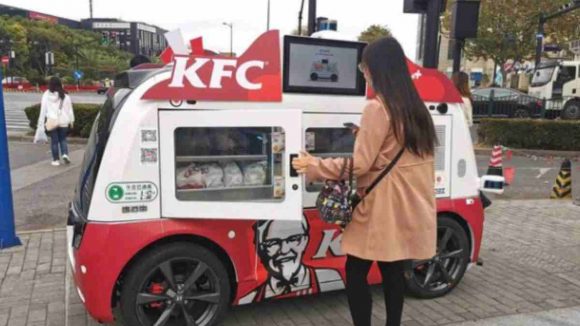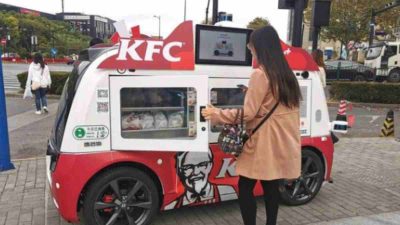The smell of warm, deep-fried chicken and fries fills the air outside China’s busy streets, where autonomous red and white KFC vans drive up and down the road. The red and white trucks are filled with orders ready to be eaten.
The more things change, the more they stay the same. For adults, it would be a glimpse from their past when ice cream trucks were driven by a man playing a specific song from the truck (on repeat) to lure all the kids in the neighborhood.
Now, KFC is going back to those old-school days but putting a modern spin on it with self-driving trucks.
Here’s how it works:
- Customers scan the QR code on the truck with their phones.
- Place the order.
- Makes the payment using the app.
- Once payment is received, the door opens, and the food can be removed.
Why would customers prefer this method? It’s instant, has fewer queues, and eliminates the waiting time for last-mile delivery.
Convenience definitely plays a massive marketing role here. KFC attracts customers who might not have planned to buy the food that day.
Let’s face it: technology can only handle scenarios it has been trained to do. This might not be a delivery option if you are a picky eater with extra add-ons and special requests. It definitely minimizes the customer pool.
KFC autonomous truck is not for everyone
Photos of the self-driving KFC trucks have left social media a buzz lately. Someone asked if these vans would even be able to “survive long in our cities like Philadelphia, Chicago, San Francisco, NYC?”
While many think it is moving into the future, others are skeptical about whether it will pass the vandalism test in some countries.
Manufacturers focusing on autonomous vehicles
Neolix is the manufacturer of self-driving vehicles. Its driverless cars operate in 12 countries and over 40 cities. Neolix’s autonomous mobility solutions aim to make “autonomous vehicles available worldwide” and take advantage of “AI, robots, and electronic vehicles.”
“Neolix is committed to the application innovation and commercialization of autonomous delivery technology in various fields and diversified scenarios. [We want to make] autonomous vehicles a basic service facility of smart cities so that everyone can enjoy the new services brought by autonomous driving.”
Autonomous vehicles concerns
While some believe robotic vehicles driving in the suburbs can be the next last-mile delivery in logistics, the public might need more convincing.
According to a study conducted by Forbes Advisor, 93% of Americans have concerns about some aspect of self-driving cars. Their main concerns are “safety and technology malfunctions.”
Despite this fear, 81% of Americans have never been in a self-driving vehicle. More than 60% of those surveyed wouldn’t trust a self-driving car with their loved ones or children.
KFC’s introduction of self-driving trucks in China presents a unique fusion of nostalgia and cutting-edge technology. It also poses intriguing questions about the intersection of technology and consumer preferences. One that only time will tell.
About the author
Mia is a multi-award-winning journalist. She has more than 14 years of experience in mainstream media. She's covered many historic moments that happened in Africa and internationally. She has a strong focus on human interest stories, to bring her readers and viewers closer to the topics at hand.











